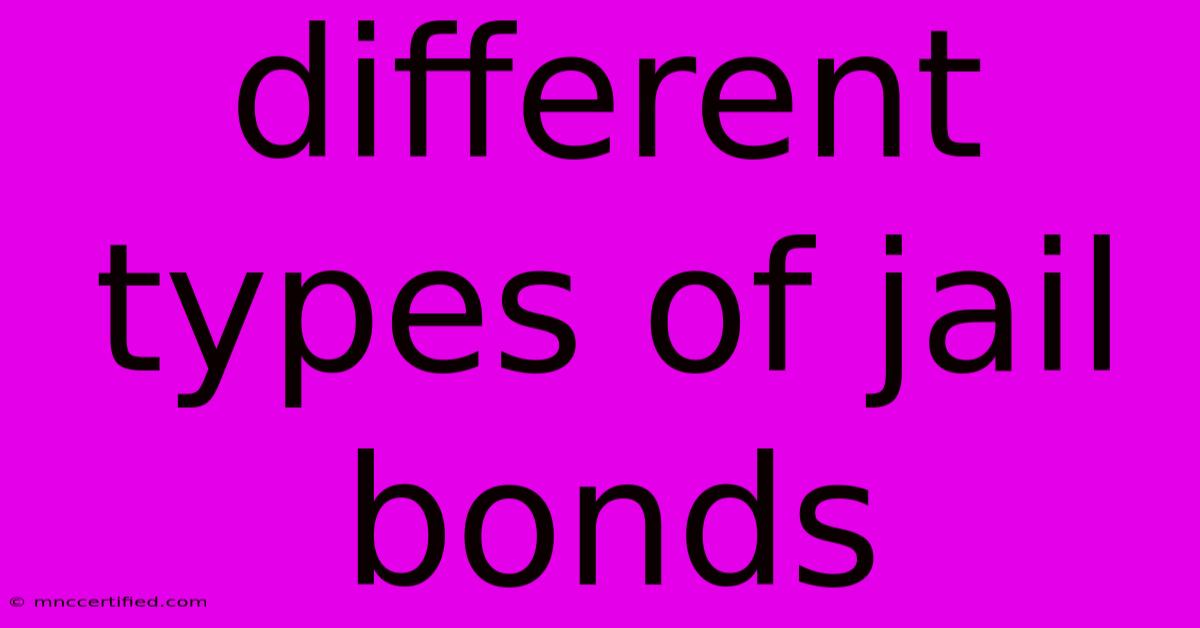Different Types Of Jail Bonds

Table of Contents
Different Types of Jail Bonds: A Comprehensive Guide
Getting arrested and facing jail time is a frightening experience. Understanding your bail options is crucial to regaining your freedom. This guide explores the different types of jail bonds, helping you navigate this complex process. Knowing your options empowers you to make informed decisions during a stressful time.
Understanding Bail Bonds
Before diving into the types of bonds, let's define what a bail bond is. A bail bond is a financial guarantee ensuring you appear in court for your scheduled hearings. It's a promise to the court that you won't flee. If you fail to appear, the bond amount is forfeited.
Several types of bonds exist, each with its own requirements and implications. The type of bond available to you depends on various factors, including the severity of the charges, your criminal history, and your financial situation.
Types of Jail Bonds
Here's a breakdown of the most common types of jail bonds:
1. Cash Bond
This is the most straightforward type. You pay the full bail amount in cash to the court. Once the case is resolved and you've fulfilled all court requirements, you receive your money back. This is the most secure option for the court, ensuring your appearance. However, it requires significant upfront capital.
Pros: Guarantees release, full refund upon case completion.
Cons: Requires a substantial amount of cash upfront.
2. Property Bond
If you lack the cash for a cash bond, you might qualify for a property bond. This involves pledging a piece of real estate as collateral. The property's value must typically exceed the bail amount significantly. The court places a lien on your property until the case concludes. If you skip your court date, the court can seize and sell your property to recover the bail amount.
Pros: Allows release even with limited cash resources.
Cons: Risks losing your property if you fail to appear in court. Requires significant equity in your property.
3. Surety Bond (Bail Bondsman)
This is arguably the most common type of bond, especially for those who cannot afford a cash or property bond. A surety bond involves working with a licensed bail bondsman. The bondsman pays the bail amount to the court on your behalf, but you pay them a non-refundable fee, typically 10% of the bail amount. This fee is essentially their commission for taking on the risk. If you fail to appear, the bondsman is responsible for paying the full bail amount to the court. They will then actively pursue you to recover their losses.
Pros: Requires a smaller upfront payment.
Cons: Involves a non-refundable fee, and failure to appear can lead to further legal action from the bondsman.
4. Release on Recognizance (ROR)
This is the most favorable option. An ROR bond means you're released without having to post any money or property. The court believes you're a low flight risk and will appear in court. This is often granted for minor offenses and individuals with clean criminal records.
Pros: No upfront cost.
Cons: Not available for all cases or individuals.
5. Unsecured Bond
Similar to an ROR, an unsecured bond doesn't require any upfront payment. However, if you fail to appear in court, you are liable for the full bail amount. This is a greater risk for the court than an ROR.
Pros: No upfront cost.
Cons: You are still financially liable for the bail amount if you miss court.
Choosing the Right Bond
The best type of bond for you depends heavily on your individual circumstances. Consider the following:
- Your financial resources: Do you have enough cash or valuable property to secure a cash or property bond?
- Your risk assessment: Are you considered a low or high flight risk by the court?
- The severity of the charges: More serious charges often require higher bail amounts.
It's always recommended to consult with an attorney. They can help you understand your options and advise you on the best course of action based on your specific legal situation.
Off-Page SEO Considerations
To improve the search engine ranking of this article, consider the following off-page strategies:
- Backlinks: Reach out to legal blogs, websites focused on criminal justice, and relevant online forums to link back to this article.
- Social Media Promotion: Share this article on relevant social media platforms to increase visibility and drive traffic.
- Guest Posting: Write guest posts on other websites in related niches, including a link back to this article.
By implementing both on-page and off-page SEO strategies, you can ensure this article reaches a wider audience and achieves higher rankings in search engine results. Remember to always update the content to ensure it remains relevant and informative.

Thank you for visiting our website wich cover about Different Types Of Jail Bonds. We hope the information provided has been useful to you. Feel free to contact us if you have any questions or need further assistance. See you next time and dont miss to bookmark.
Featured Posts
-
Liverpool Real Madrid Live Score Updates
Nov 28, 2024
-
Vikings Sign Jones To Practice Squad
Nov 28, 2024
-
Partner Dee Supports Conor Mc Gregor
Nov 28, 2024
-
Mishal Husains Bbc Exit Confirmed
Nov 28, 2024
-
Vanderpump Rules Concludes Season 11
Nov 28, 2024